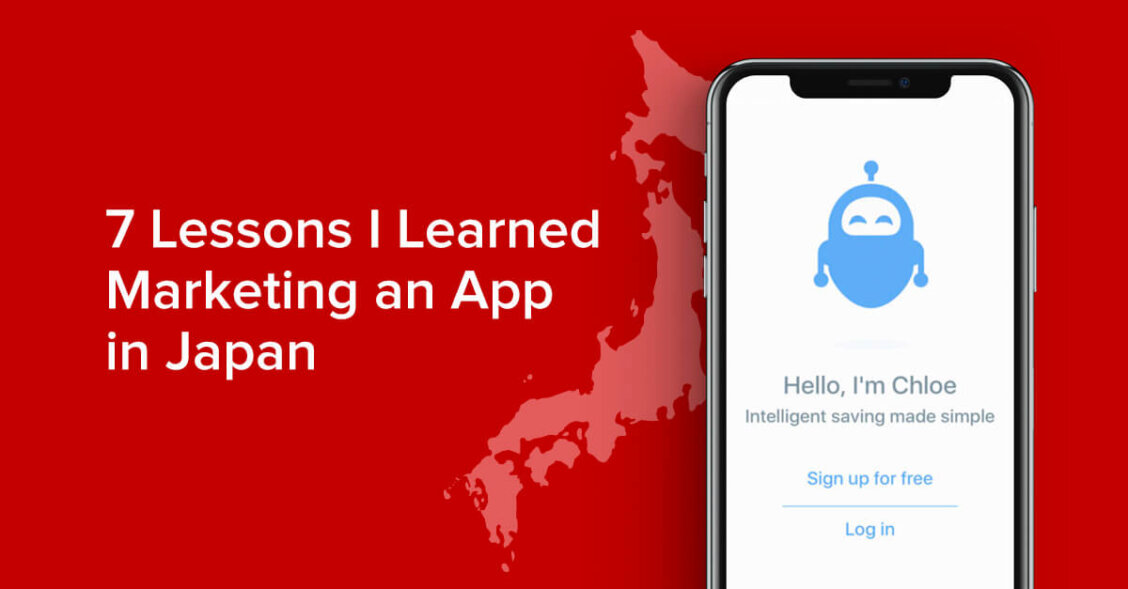
7 Lessons I Learned Marketing an App in Japan
[GUEST BLOG] In 2017, we announced the launch of Chloe in Japan, our goal based robo-advisor mobile app. Chloe is the first robo-advisor app in the world that constructs portfolios with exchange traded funds (ETFs) listed at the Tokyo Stock Exchange (TSE). The portfolios are diversified across 50 countries, 37 industries and 4,324 stocks and bonds. The service is available both on iOS and Android and is the first robo-advisor in Japan available entirely on smartphones and tablets.
In tandem with a powerful PR outreach effort, we got to work immediately on setting up a formidable mobile user acquisition campaign to generate traction and to enable our target audience in Japan to take advantage of the new service.
Through that process, we developed a series of best practices which, some through trial and error, were important lessons to learn in marketing a finance app in Japan.
Lesson #1: Brand matters in Japan.. a lot
Corporate brand recognition plays an over-indexed role in the customer decision journey for financial services in Japan.
A robo-advisor conversion funnel is extremely deep. It requires users to not just discover/download our app, register for our service, and complete a risk profile questionnaire, but also submit a copy of their social security number for our internal approvals, and later complete a bank wire transfer to fund their accounts. Getting a customer to share that level of financial and personal detail within the conversion funnel requires a huge amount of trust from the user.
No amount of core product value, nor hard core acquisition and reengagement marketing activities can compensate for a lack of brand recognition. Japanese users place a heightened level of emphasis on local player affiliation when making decisions related to matters of finance.
A lack of brand recognition will artificially inflate and exacerbate all metrics in your marketing campaign (CPI, CPC, CPA, CTR, LTV, etc) to levels which would be difficult to stomach and could have been much lower had users been conditioned to be aware of your brand throughout the decision making journey.
Lesson #2: Facebook and Google do not rule the world
Based on global advertising trends, it is easy to assume that every media plan should include the advertising duopoly of Facebook and Google. But do the homework on whether your target audience maps to that reality. For example, in Japan, Facebook has less market share than in other markets, covering approximately 20% of the total Japan population. This is for news feed (not Facebook audience network).
Do not over index your marketing budget towards Facebook and Google, because everyone else is doing it. Test and shift budgets towards those channels, if your cost constraints and conversion metrics tell you so. Most channels have overlapping target audiences in Japan; so make sure you are actually reaching net new users (or mostly net new) when making media buying determinations.
In Japan, for example, there are tons of media channels to test and experiment on; examples include Smart News, Twitter, Yahoo! JAPAN, local financial sites and many more, some of which offer creative flexibility, ad format resonance, stronger targeting, reporting and at a net-cost efficiency greater than the multinational channels.
Lesson #3: Flying blind is dangerous – avoid it
You cannot control what you do not observe. Don’t underestimate just how critical it is to have full attribution on each stage of the conversion funnel. Even for a new service, it’s important to get tracking right before you start spending. Each stage of the conversion funnel represents an intent signal that enables you to run A/B tests on which re-engagement tactics are most effective. Do not assume that each event in the conversion funnel is of equal value.
Make sure your line of sight attribution from ad creative to post-install conversion events are as clean as possible; because if it isn’t, it will make you lose hours of sleep as you realize you’re not actually measuring what’s really important.
Lesson #4: Manage expectations – Communicate but do not over promise
It is easy to beat your chest hard to think you wipe the domestic competition with your acquisition wizardry and amazing onboarding. That is why they hired you, right?
Well, think again.
You must set expectations appropriately within your company (both at management and at the local internal level) about what you can deliver. Sky is the limit, but there is the law of gravity. Remember you are spending company (shareholder) money, not your own money. It is absolutely essential to demonstrate to everyone in the company that you can manage marketing money with a defined process, based around the customer journey. While frameworks can transcode between countries, tactics differ and what worked in Asia does not work in Japan and vice versa.
Lesson #5: Japanese ad tech eco-system is extremely dense – navigate it with caution
The Japanese advertising eco-system is flooded with technology and service providers that want to work with you to cut through the media clutter and help you reach your audiences. In Japan, there is an agency or vendor for everything, from data management, brand safety, data efficiency, CPA buying, offline/online attribution, DSPs, market research specialists, etc. Its surprising to see so many ad tech vendors in a country of only 120M people.
Yes, ad tech vendors have a place, and some genuinely offer very compelling capabilities. But remember, you are the boss. You set the strategy, you outline what your objective functions are, and together you build and share localized best practices while the vendor executes the setup on your behalf with iron-clad client/vendor cadence every step of the way.
Lesson #6: Automation is critical
It is important to reassure users throughout each stage of the conversion funnel. Automated push notifications from Mixpanel or other MMAs can help – but do not rely on them solely. Do not assume that push notifications will push users through the funnel. Re-engagement emails are powerful but has its limits. Be creative. Try testing push notifications at different times of day. Do not spam the user.
Lesson #7: Growth experimentation needs a process
In Japan, we pride ourselves on speed. As Mark Zuckerberg said, “be agile and fail fast.”
But fast failing and agility does not mean you operate without a framework and structure. It is absolutely critical to have a defined structure and hypothesis when running marketing experiments, no matter what region you are in. User stereotypes and gut feelings should not be used as a total substitute to a data driven mentality. It is important to know what you think you will get out of an experiment, before you actually run the experiment. Will Japanese users feel more compelled to download your app from the mobile website or the app store directly? Are your a/b bucket tests large enough to derive a positive conclusion (or false negative?)
These are just some of the best practices we want to share with you, some of which are very similar to running campaigns in other parts of the world, and some which are not. The key is to keep trying. There is NOTHING easy about mobile marketing. And if you are not making mistakes, you are not learning. It’s all about testing, execution and trying your very best.
 About Andrew Wong
About Andrew Wong
Andrew Wong is the head of Marketing for 8 Securities, a leading mobile first investing service. He is responsible for marketing several popular finance apps in Japan and Hong Kong. Prior to joining 8 Securities, Andrew spent over 10 years in marketing leadership roles at Yahoo! in Los Angeles, Silicon Valley, Asia-Pacific, and Japan. A Silicon Valley native, Andrew graduated from NYU Stern and is a piano player in his spare time.
About 8 Securities
Launched in 2012, 8 Securities is a mobile first investing service with licensed offices in Hong Kong and Tokyo. The company has a history of innovation, having launched Asia’s very first robo-advisor wealth management app and $0 commission stock trading app. The apps are available in the App Store and in the Google Play store in English, traditional and simplified Chinese, and Japanese. In October 2017, IDC listed 8 Securities on its Asia Fast Fintech 101 list and named the company as one of the 10 fastest growing fintechs in Hong Kong.